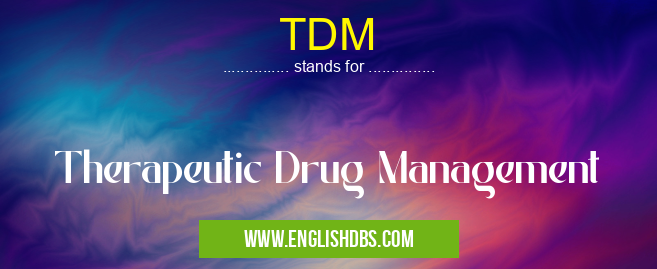What does TDM mean in MANAGEMENT
Therapeutic Drug Management (TDM) is a specialized healthcare practice that optimizes drug therapy for individual patients. It involves monitoring drug levels in the body and adjusting doses to achieve optimal therapeutic outcomes while minimizing adverse effects.

TDM meaning in Management in Business
TDM mostly used in an acronym Management in Category Business that means Therapeutic Drug Management
Shorthand: TDM,
Full Form: Therapeutic Drug Management
For more information of "Therapeutic Drug Management", see the section below.
» Business » Management
What is TDM?
TDM is an interdisciplinary approach that combines pharmacology, clinical chemistry, and clinical practice. It focuses on:
- Individualizing drug regimens: Tailoring drug doses based on a patient's unique characteristics, such as age, weight, renal function, and drug interactions.
- Monitoring drug levels: Using laboratory tests to measure drug concentrations in the blood or other bodily fluids.
- Adjusting doses: Modifying medication dosages as needed to maintain therapeutic drug levels and minimize toxicity.
Benefits of TDM
- Improved patient outcomes: TDM ensures that patients receive the appropriate drug dose for their individual needs, leading to optimal therapeutic effects and reduced adverse events.
- Reduced drug toxicity: By monitoring drug levels, TDM helps prevent drug overdose and associated toxicities.
- Enhanced drug safety: TDM enables early detection of drug interactions and other potential issues, ensuring patient safety.
Indications for TDM
TDM is typically used for drugs with a narrow therapeutic index, meaning a small difference between effective and toxic doses. Examples include:
- Anticonvulsants (e.g., phenytoin, valproic acid)
- Antiarrhythmics (e.g., digoxin, amiodarone)
- Antibiotics (e.g., vancomycin, gentamicin)
- Immunosuppressants (e.g., cyclosporine, tacrolimus)
Process of TDM
- Drug level monitoring: Blood or other bodily fluid samples are collected and analyzed to determine drug concentrations.
- Dose adjustment: The healthcare provider reviews the drug level results and adjusts the dosage as necessary to achieve the target therapeutic range.
- Ongoing monitoring: Regular drug level monitoring is conducted to ensure that the drug remains within the desired range and to make any necessary further dose adjustments.
Essential Questions and Answers on Therapeutic Drug Management in "BUSINESS»MANAGEMENT"
What is Therapeutic Drug Management (TDM)?
TDM is a personalized approach to medication therapy that involves monitoring drug levels in the body to optimize treatment outcomes. By measuring drug concentrations, healthcare professionals can adjust dosages and ensure that patients receive the correct amount of medication for their individual needs.
Why is TDM important?
TDM is crucial because it helps ensure that patients receive the most effective dose of medication while minimizing the risk of side effects. It allows healthcare professionals to tailor treatment plans based on individual factors such as age, weight, kidney function, and other medications being taken, ensuring optimal therapeutic outcomes.
What medications are typically monitored with TDM?
Medications commonly monitored with TDM include antibiotics, anticonvulsants, antidepressants, antipsychotics, and immunosuppressants. These medications have narrow therapeutic ranges, meaning that the difference between an effective dose and a toxic dose is small.
How is TDM performed?
TDM involves collecting blood or urine samples at specific time points after a patient takes medication. These samples are then analyzed to determine the drug concentration in the body. The results are used to adjust medication dosages as needed.
What are the benefits of TDM?
The benefits of TDM include improved medication efficacy, reduced side effects, and increased patient safety. It also helps prevent drug interactions and adverse reactions, ensuring optimal treatment outcomes.
What are the limitations of TDM?
TDM can be time-consuming and expensive, and it requires patients to comply with regular blood or urine testing. Additionally, not all medications are suitable for TDM, and it may not be feasible for certain patient populations.
Final Words: TDM is a valuable healthcare practice that optimizes drug therapy, improves patient outcomes, reduces drug toxicity, and enhances drug safety. It is particularly important for medications with a narrow therapeutic index and requires the collaboration of healthcare professionals from various disciplines.
TDM also stands for: |
|
| All stands for TDM |
